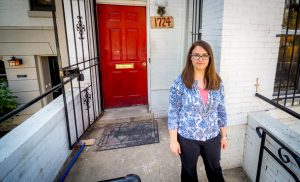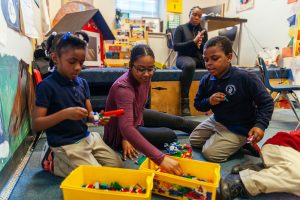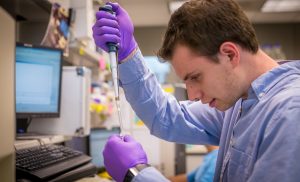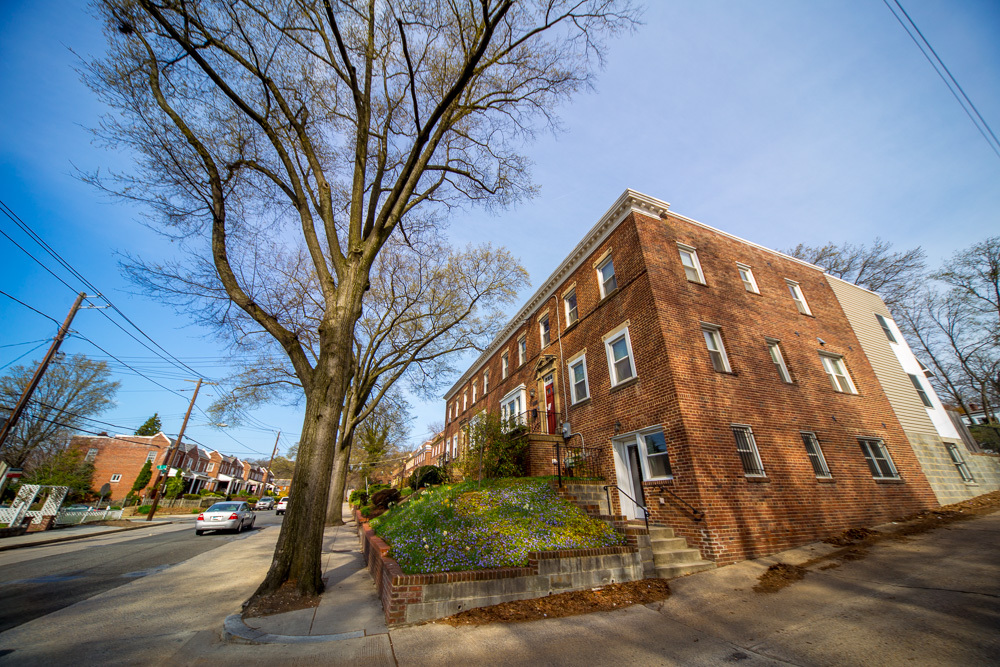What influences students to come to the Washington Community Scholars’ Center? Professor recommendations.
In May, nine faculty representing the business and leadership, chemistry and biology departments at Eastern Mennonite University traveled to Washington D.C. to visit internship sites. The group also toured the Nelson Good House where students live and visited the surrounding Brookland neighborhood to gain a full perspective on life in the program.
This visit came as part of a broader WCSC initiative to increase connections with faculty on EMU’s main campus.
“From campus, we hear about the program and you get a picture in your mind of how things are and that’s not always the clearest or most accurate, so seeing the physical space was very helpful,” said business professor Jim Leaman.
Professors said the WSCS visit better prepared them to advise students about D.C. internships, which are viewed positively by prospective employers and by graduate schools.
Enthusiastic site supervisors guide intern learning

Faculty divided into three groups, each led by a WCSC staff member, to visit internships and talk with supervisors. At Christ House, an inpatient medical facility for men experiencing homelessness, Clinical Director Mary Jordan gave a brief tour. EMU nursing students have gained experience with patient intake, wound care and vital sign checks while building strong rapport with the patients.
Professor Julia Halterman, who co-directs the MA in biomedicine program, took note of Jordan’s enthusiasm for student interns and the practical experiences students gain.
“They do a good job of training students to see many different facets [of the medical profession],” Halterman said, “Students get to have more patient contact experience than other places. This is really important to have for pre-physician students.”
The next stop was Georgetown University Hospital’s Histocompatibility Lab. The laboratory, located in the inner workings of the clinic, offers hands-on mentoring from experienced research scientists. The lab tests for matches between organ donors and recipients and is part of a broader world-class teaching and research hospital.

“I think our students will be thrilled to go up there and have those opportunities.” Halterman said, adding that these experiences are often what set individual students apart when applying to medical school.
The care with which site supervisors mentor interns and the quality of tasks assigned was a main takeaway for faculty visits. At the YMCA, professors from the business and leadership department, met with four supervisors who have worked with WCSC interns in the areas of accounting, human resources, and sports and recreation management.
WCSC offers variety of opportunities
Professor Leah Kratz noted the depth and variety of learning that students can gain from such organizations in contrast to the primarily tax-based accounting internships available in the Harrisonburg area.
Students in the Sports Studies and Recreation Leadership program, supervised by Professor Joo Hyun Lee, can gain experience with everything from program planning to coaching.
“The amount of investment that supervisors are willing to make in their interns and in young people in general is just fantastic,” said Leaman. He speculated that DC internships are especially primed for quality internship supervisors since organizations are used to having interns from the many local universities and from around the world. Supervisors have honed opportunities over time and are comfortable with their role of training interns and excited to engage and develop them.

The importance of strong internship supervisors was not lost on professors Jim Yoder and Doug Graber-Neufeld, who teach biology and environmental science. A visit to the National Religious Partnership for the Environment, which builds coalitions between diverse faith-based groups concerned with environmental issues, took them to an historic building overlooking the Capitol, across the street from the Supreme Court.
Graber-Neufeld, who also directs the Center for Sustainable Climate Solutions, noted a management style that empowers “self-starters.”
A short trip to the river brought the group to the Anacostia Watershed Society where CEO Jim Foster invited them into his boat overlooking a surrounding urban park.
Both faculty noted the breadth of opportunities for interdisciplinary environmental science students at the organization. Interns work with invasive species, water quality monitoring and other lab work. They also work with environmental education and gain experience in how the river and urban development around it affect the surrounding neighborhoods, linking the science with social and economic sides of the field.
For Kratz, Lee, and Leaman, a visit with staff from the Washington Area Community Investment Fund exemplified the lasting effects that strong relationships between interns and mentors can have. Executive Director Harold Pettigrew raved about former intern and Bluffton University student Jason Summers, who held the spotlight in their “Intern Hall of Fame,” going above and beyond the tasks assigned and even sending them a box of famed gourmet popcorn from Bluffton after leaving. Such experiences often pave the way to jobs, either in the organization itself or through connections made there.
In addition to noting the dedicated mentoring that supervisors provide WCSC interns, professors highlighted the benefits of seeing the neighborhood and group house where students live.
“The house, the neighborhood, and even seeing Kim and Ryan in the context of the program allows me to talk in a lot more detail about the experience with prospective students,” Yoder reflected. “I feel I can recommend the program with a lot more confidence. And be a lot more specific with students when advising.”
Leaman added that using the metro to get around the city helped him get a feel for what the experience would be like for students, noting the contrast between the hustle and bustle of the downtown areas and the quietness of the residential neighborhood where students in the program live.
Reflecting on the day as a whole, Leaman said, “We loved it. Give this opportunity to everyone!” He added, “The van ride out and the way back allowed us to connect with faculty we don’t often see from across campus.”
The WCSC program plans to continue the model: inviting faculty from two departments at a time to come to DC for a visit of the program and placements where their students come to intern.
